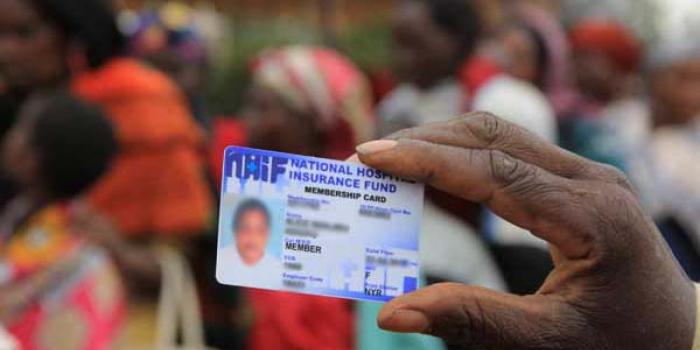Parliament in an effort to boost the Government’s Big Four agenda to ensure universal health care coverage system has passed the amendments to the National Hospital Insurance Fund Act 1998. The Amendment bill is expected provide the all-necessary shot in the arm to the government’s efforts towards achieving universal healthcare
Long title.
The long title describes National Hospital Insurance Fund Act as an Act of Parliament to establish a National Hospital Insurance Fund; to provide for contributions to and the payment of benefits out of the Fund; to establish the National Hospital Insurance Fund Management Board and for connected purposes. To bolster the effect of the Act the amendment bill proposes to amend the long title by inserting the words “to establish the national health scheme. This amendment ushers in a paradigm shift with regard to access to health insurance as the fund is being transformed from a Hospital Insurance fund to a national Health scheme.
Beneficiaries.
Clause 2 of the bill expands the scope of beneficiaries to the scheme to include a person who—
(a) Has not attained the age of twenty-one years, has no income of his own and is living with the contributor;
(b) has not attained the age of twenty-five years, is undergoing a full-time course of education at a university, college, school or other educational or serving under articles or an indenture with a view to qualifying in a trade or profession and is not in receipt of any income other than a scholarship, bursary or other similar grant or award;
(c) Is either mentally or physically handicapped and is wholly dependent on and living with the contributor;
(d) Is a spouse; or
(e) Is a contributor
To operationalize the above provisions, clause 21 empowers the board to prescribe the mode of identification of beneficiaries and payment of contributions.
Registration as a member of the Fund.
Pursuant to clause 15 A of the bill, it is now a mandatory requirement for any person who has attained the age of eighteen years and is not a beneficiary is required to register as a member of the Fund whether employed or not. This amendment proposes to increase contribution to the fund
Indigent and vulnerable persons.
The bill proposes contributions of the indigent and vulnerable persons identified paid for them by the national government Empanelled Health care providers
Corporation secretary.
To effectively deliver on its mandate, the amendment empowers the Board to competitively recruit a qualified person to serve as a Corporation Secretary of the Board. The appointment of the Corporation Secretary should comply with the “Mwongozo”-Code of Conduct for State Corporations. The Corporation Secretary is responsible forl—
(a) In consultation with the Chairperson of the Board, issue notices for meetings of the Board.
(b) Keep, in custody, the records of the deliberations, decisions and resolutions of the Board.
(c) Transmit decisions and resolutions of the Board to the Chief Executive Officer for execution, implementation and other relevant action.
(d) Provide guidance to the Board on their duties and responsibilities on matters relating to governance.
(e) Perform such other duties as the Board may direct.
Empanelled health care providers.
The amendment bill does away with the concept of declared hospitals and introduces what is termed as empanelled health care providers. Empanelment is enrolment of a health care provider into the list of health care service providers published in the Gazette.
The definition of a hospital as provided in the act is restrictive to any medical institution or premises in which persons are received and treated as out-patients or in-patients, and includes a maternity home, a nursing home and a health clinic. The amendment bill adopts a broad definition of health care provider to mean the whole or part of a public or private institution, building or place, duly registered healthcare professional, whether for profit or not, that is operated or designed to provide in-patient or outpatient treatment, diagnostic or therapeutic interventions, nursing, rehabilitative, palliative, convalescent, and preventative or other health service.
Employers
Clause 10 of the bill amends section 15 of the Act by making a mandatory requirement for an employer whose employee is liable as a contributor to the Fund to make a matching contribution, equal to that which their employee is liable to contribute to the Fund.
Enhanced Benefits
The new amendment empowers the board to make guidelines providing for a person who wishes to receive enhanced benefits to make additional voluntary contributions to the Scheme.

Leave a Reply